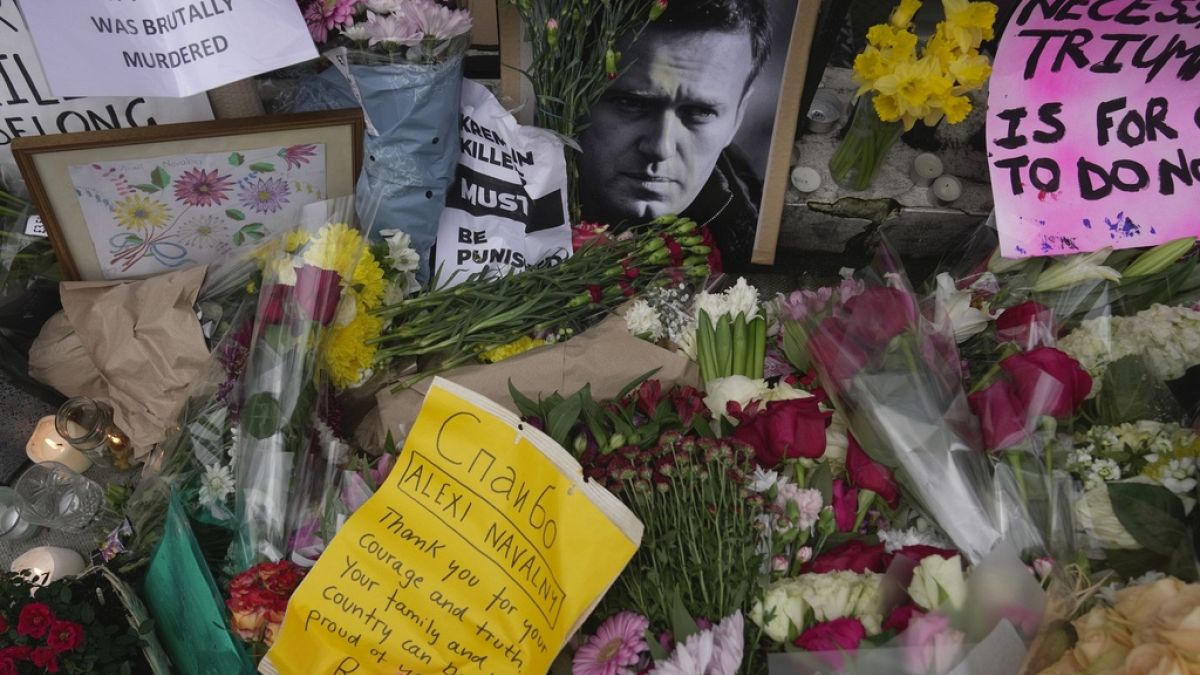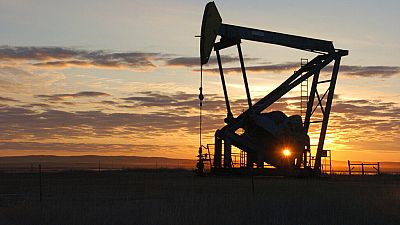On the two year anniversary of the Russia-Ukraine war, Euronews Business looks at how Russian businesses have done in the face of various international sanctions.
24 February 2024 marks the two-year anniversary of Russia’s invasion of Ukraine. Back in February 2022, in a move that shocked the international community, Russia launched its special military operation against Ukraine.
According to November 2023 data by the United Nations Human Rights Monitoring Mission in Ukraine, at least 10,000 civilians, including 560 children have been killed in Ukraine, since the invasion began. Russia, on the other hand, is estimated to have lost upwards of 300,000 troops, according to declassified US intelligence reports.
Since the start of the war, Russia has faced increasing sanctions from the UK, US, EU, Canada, Australia, Japan and Switzerland, amongst others, impacting both its businesses and certain individuals.
What are some recent sanctions imposed on Russian businesses?
Most recently, to mark the two-year anniversary of the invasion, the UK has announced more than 50 new sanctions against Russia, mainly impacting electronics companies, munitions manufacturers and oil and diamond traders.
These are intended to erode Russia’s war funding by targeting the industries that bring in most of the country’s income. Furthermore, with sanctions on munitions manufacturers, the UK is also making sure to deal a strong blow to Moscow's weapons arsenal. These are mainly expected to impact companies providing the Russian armoury with explosives, rocket launch systems and missiles.
On 22 February, the UK’s Foreign Secretary David Cameron said, “Ukraine has shown that it can and will defend itself. And two years on, we stand united in support of Ukraine."
“Our international economic pressure means Russia cannot afford this illegal invasion. Our sanctions are starving Putin of the resources he desperately needs to fund his struggling war" he added.
And he stressed, “Together, we will not let up in the face of tyranny. We will continue to support Ukraine as it fights for democracy- for as long as it takes.”
Earlier on in January, as part of its 12th package of Russian individual and economic sanctions, the EU included PJSC Alrosa, the Russian state-owned diamond mining company, as well its CEO Pavel Alekseevich Marinychev on its sanctions list. Alrosa, however, has already been sanctioned by the US, UK, Canada, The Bahamas and New Zealand since 2022.
Have these sanctions worked so far?
According to the European External Action Service (EEAS), the sanctions imposed by the EU on Russia managed to hit several sectors of the Russian economy quite hard in 2022.
EEAS notes that the Russian manufacturing sector shrank 6% by the end of 2022, with motor vehicles production being down 48% year-on-year. Wholesale trade declined 17% year-on-year in 2022, with retail trade inching down 10%. High and medium technology manufacturing also saw an annual loss of 13%.
However, last year, the tide seemed to be turning, with Russian factory activity having advanced at its fastest pace in nearly seven years in December 2023, according to the S&P Global Purchasing Managers’ Index. The Russian vehicle market also surged about 120% in September 2023.
The Russian government has also managed to evade sanctions by selling gold reserves to keep funding the Ukraine war, amongst other methods. One of the most pervasive amongst these is a global network of corruption and shadow entities which act on Russia’s behalf when it cannot do so openly.
Russian businesses have also been setting up a number of subsidiaries and shell companies in countries with relatively good ties to Russia, which may not scrutinise their operations too much.
These include Georgia, Armenia, Kazakhstan, UAE and Turkey, amongst others. Through these subsidiaries and countries, both the Russian government and businesses are still able to access sanctioned products such as semiconductor chips and weapons.
Russia’s “shadow fleet”, composed of a number of smaller oil tanker operators with ships in various states of decline, are also helping it avoid oil sanctions by making sure that very few shipments of seaborne Russian Urals oil are happening below the $60 price cap imposed by Western sanctions. These ships are typically provided by countries such as Cameroon or Liberia.
Oil and energy companies
PJSC Gazprom Neft, the oil-producing subsidiary of the Russian gas mammoth Gazprom, was one of the oil companies sanctioned by the EU back in March 2022, in an attempt to restrict Russia’s oil revenues.
Since then, the company’s Q2 2023 net profits fell about 43% because of discontinued sales, which the company revealed after a year of not publishing its financial results. The company also recently announced that it was putting its Bulgarian service stations up for sale.
However, in late 2023, Gazprom Neft seemed to be perking up once again, announcing that it would be increasing its exploration efforts and refocusing on projects that were left on hold during the pandemic.The company’s CEO Alexander Dyukov has not faced any EU sanctions and still has property on the French Riviera.
Rosneft, another Russian oil producer, was also sanctioned back in March 2022. However, the company recently announced annual profits of about $14 billion (€12.9 billion) for the full-year 2023.
Rosneft highlighted that it has had to expand its gas production facilities due to external restrictions on oil. The company has also been in talks with the German government over potential plans to nationalise Rosneft Germany.
The largest oil pipeline company in the world, Transneft, also sanctioned, revealed that its pipeline oil exports were down 6.5% in 2023.
The Swiss-based energy company Paramount Energy and Commodities was also one of the energy companies sanctioned by the UK in November 2023, which claimed that Russia had been using the company’s opaque ownership structure to its advantage, in order to reduce the impact of G7 oil sanctions.
Mining companies
Nordgold, Highland Gold, Ural Mining and Metallurgical company and Alrosa are some of the Russian mining companies which have been impacted by international sanctions.
Nordgold, one of the biggest Russian gold miners, was sanctioned by the UK back in November 2023. These also extended to Marina Mordashov, billionaire Aleksey Mordashov’s wife who is reported to own 52% of Nordgold shares.
However, this does not seem to have deterred the company much since then, as it was reportedly looking into Brazilian mining investment opportunities by the end of November last year. This involves gold, lithium and copper exploration.
Brazil’s mining regulator ANM’s director general Mauro Sousa said in a statement “Russia is Brazil’s strategic partner as part of the BRICS and it is important that it is not only investing in gold but in critical minerals for the energy transition and green economy.”
However, in some other cases, these sanctions seem to be working. Earlier in 2023, Canadian mining firm Orea Mining announced that it would be postponing buying Nordgold’s stake in the Montagne d’Or gold project in French Guiana until all sanctions by the UK, Canada, France, EU and US were removed.
This was following Orea Mining’s acquisition permit for this project being rejected by the Canadian government.
In cases where the owners or CEOs of a mining company have been sanctioned and not the actual company, the impact on the business seems to have been quite minimal as well.
One example of this is the fourth largest Russian gold miner Uzhuralzoloto (UGC) whose owner Konstantin Strukov has also been sanctioned. However, despite this, the company launched its initial public offering (IPO) on the Moscow Exchange last November.
The company also said that it may pay up to 50% of profits to shareholders in a new dividend policy that it was still preparing. UGC also emphasized that the sanctions imposed on its owner would have little effect on its own operations, work or exports, due to the company not being reliant on equipment made in the West.
Russia’s diamond sector also suffered another blow in January, with Alrosa, the state-owned diamond mining company being sanctioned by the EU. However, the diamond manufacturing company was struggling quite a while before that, under the weight of sanctions imposed by various other countries.
Back in September 2023, as reported by Rapaport, the company conveyed to the India Gem & Jewellery Export Promotion Council (GJEPC) that it would be cancelling two upcoming sales due to dampened demand.
In a note to the GJEPC, the company said, “Alrosa has decided to temporarily halt the allocation of rough diamonds in September and October 2023. We believe that this approach is going to have a stabilising impact by strengthening the market’s supply and demand balance. This will aid the prevention of overstocking, especially with manufacturers closed for Diwali.”
Financial institutions
On February 2024, the day of Russia’s invasion in Ukraine, the US reacted swiftly and decisively by imposing restrictions on the top 10 financial institutions in Russia.
About $46 billion (€42.4 billion) worth of foreign exchange transactions is done each day by Russian financial institutions. Due to approximately 80% of these being in US dollars, these sanctions are expected to exact a very heavy toll on the Russian banking and financial system.
Amongst those sanctioned, Sberbank and VTB Bank are two of the most important, accounting for more than a half of the Russian banking system, if asset value is taken into consideration. However, most of their operations rely on payments being processed through the US financial system.
But some critics say these sanctions are not strong enough and point to the fact that Sberbank still reported a record $17 billion (€15.7 billion) annual profit in 2023. The bank, which is currently about half-owned by the Russian government, is also exploring privatisation opportunities.
Furthermore, it has also recently launched direct bank transfers to Iran, which is also facing a number of Western sanctions, for both businesses and individuals. This move is allegedly to help tourists, as Russia has developed closer economic, military and political ties with Iran following the Ukraine war.
For VTB Bank, these sanctions seem to have been more effective, with the bank’s UK branch slipping into insolvency in the face of the Ukraine war. It is expected to stay in administration until the end of this year.
However, the bank has also revealed that it plans to expand to China in the coming months, with Russia also strengthening ties with China after being ostracised by the international community. Back in September 2022, VTB was also the first Russian bank to go around the SWIFT payment system and send money transfers to China in yuan.



